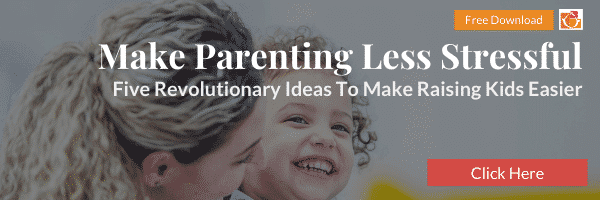Parenting is a real workout, right?
You never have enough time, patience, or energy to juggle kids, work, household, adult relationships, and your own personal health and wellbeing. The children pose one challenge after another: you deal with everything from spilled milk to raw aggression. There are the months and sometimes years of interrupted sleep; the breakfast disappointments; the struggles to get to school or day care; the sibling spats and resentments; the picky eating; the whining. And I’m just getting started here!
OK, what if you were able to frame that whole huge wad of work as an emotional practice? A daily workout for your feelings? What if you could see parenting as the ultimate practice for honing your resilience and deep understanding? Your path toward leading your family well through hard times and good times both?
What if you could see all your loving and caring, your frustration, the agony of not knowing what to do, all those flashes of pique and bolts of anger that surge through you, as an interesting and worthy challenge?
What if you figured, “This is emotional work. I do it every day. It comes part and parcel with parenting. For this, I need emotional support, because like it or not, I’m heavily into emotional work! I need some way to connect with other parents around how much love this job takes, and how hard I’m trying.” What if you could build an emotional outlet for your worry and grief? What if you had someone to talk with about the heartbreaking beauty you see when you look at your sleeping children?
Introducing A New Perspective on Parenting
What difference could that make? Take a look at these two different viewpoints.
The Lonely Struggle Perspective: “I sure hope the kids don’t put me through the wringer again today! When will they ever stop squabbling? And that screeching! I can’t stand it!“
The Parenting is an Emotional Practice Perspective: “Hmm, every day I’m driven to yelling and punishing. The kids’ issues don’t seem to change no matter what I do. I think I need some help with all that upset I feel when they don’t get along. Maybe if I could find a way to feel better, they could find a way to feel better. I’m going to bring this up with my Listening Partner.”
The Lonely Struggle Perspective: “This kid just won’t sleep at night! I’m so sleep deprived I don’t focus well at work. This is not fun at all! But what else is there to do—it’s time to man up! Besides, who would care? It’s not that big a deal.”
The Parenting is an Emotional Practice Perspective: “Now here’s a problem that has me stumped! I’m afraid to let my child cry it out at night, but I’m also afraid of what sleep deprivation is doing to me. I don’t know exactly who could help me, but I am going to start asking. When I ask, I think I might tear up, but what the heck. I love my kids, I’m working hard, and I have big feelings! It’s what happens when you love a kid this much.”
The Lonely Struggle Perspective: “My child keeps grabbing for my breast, even though she’s done with nursing. It’s so embarrassing! I wind up either being harsh with her, or being on edge when I’m out with her in public, because her behavior makes me ashamed. It’s sad but true. I hope we get through this somehow!”
The Parenting is an Emotional Practice Perspective: “Whoa! When my daughter grabs for my breast, I go way overboard. I feel like slapping her, so I don’t do anything at all, but I am so fed up with her at those moments. It’s time to set up a Listening Partnership and talk about this—there’s some big feeling that’s getting triggered for me. She has an issue, but I need to tackle my own issues first.”
And finally,
The Lonely Struggle Perspective: “We have problems at home. My child is still in diapers and she’s four. She won’t give them up. There must be something wrong with her—she’s never been quite like other kids. What did I do wrong? Why didn’t I get a regular kid, one who just hums along, like other kids do?”
The Parenting is an Emotional Practice Perspective: “My daughter has some special challenges. So do I! I guess we all do. I’ve been listening to other parents and I am pretty sure that every child presents challenges, and every parent struggles to do the right things for their family. She needs help, and I’m getting help, and we’ll figure it out as soon as we can. We’re doing our best, and that’s got to be good enough. Plenty good enough.”
 When you think of parenting as an emotional practice, and have the Parenting by Connection Listening Tools handy:
When you think of parenting as an emotional practice, and have the Parenting by Connection Listening Tools handy:
• You have a strategy for every occasion. When you don’t know what to do about your child’s difficulty, you offload your feelings about it. You relax a bit, and uncover new thinking and new experiments to try.
• You partner with other parents, so you aren’t so alone with parenting. You and your Listening Partner each get to tell it like it is. You get to help one another in a unique and powerful way. You offer respect and warmth, and receive it in return. You laugh, you cry, you learn. You come to depend on one another's attention and caring.
• You have principles. You adopt the belief that beneath unworkable behavior there’s a warmth and sweetness in the human heart—yours and your child’s. This keeps you oriented when you’re down on yourself, or down on your child.
• You have a way to emerge from reactive thoughts and behavior. You develop Listening Partnerships to help you do the emotional work needed to keep yourself and your family moving forward. You offload feelings. You partner with other worthy parents, who try as hard as you do to love and to live well.
• You have a learning lab! Your understanding and parenting skill grow nicely! Your Listening Partnerships help you learn how the emotional healing process works in yourself and in other grownups. Using Listening Tools with your children helps you learn how quickly healing can take place, and how beautiful and generous the human spirit is when it’s free of hurt and fear.
• You never, ever have to give up on the people you love. You might feel like giving up. You might feel desperate. You might feel overwhelmed. But when you’ve done emotional work on one issue, and seen it dissolve, you’ve got an undeniable point of reference. Healing is possible. People want to love. They want to be connected. They are intelligent. And the hurt that clouds our perspective sometimes can be lifted.
Here’s how it can work:
I live alone with my five-year-old son and have lived alone with him since he was three. He is very good at letting me know when he needs to offload his daily stresses or feelings of disconnection. He will get very angry over something that normally doesn't bother him, or will start to say “no” when I ask for his help.
It was a Tuesday, our only day off together, and after waking up, I noticed him scratching his head. I checked his hair and sure enough found lice so I washed everything and took him to get the lice out at a salon. Despite the circumstances, we had had a very connected day! The next day I woke up with food poisoning, and found that someone had broken into my car and had stolen all my work equipment. At that exact moment my son decided to get angry about having the wrong color vitamin.
I could sense that he woke up disconnected and realized that he had been trying all morning to connect—Mama, will you spend time with me? Mama, tickle me! Mama, wrestle with me—but I had nothing in me to connect with him. The previous and present day had taken a toll on me and I found myself dangerously close to yelling at him.
Barely holding myself together, I managed to get him to school, surprised that I hadn't done any major harm. After dropping him off, I immediately reached out to a Listening Partner. I cried long and hard about single parenting and the occurrences of the last two days. Having the opportunity to freely experience fear, shame, stress and sorrow with no judgment allowed me to “clean out my emotional closet” and approach the rest of the day with a fresh perspective.
Later that afternoon, I picked up my son and had the mental space to hear his feelings around the lice and the violation of our car. I was calm and open to hearing his feelings, however they happened to come out. It was reassuring to know I had somewhere to go with my stresses so I could be there for his without taking them on as my own.
–A mother in Oakland, CA
Does Parenting Feel Overwhelming Right Now?
Learn what you can begin practicing today to lower your parenting stress. Share tips now.

